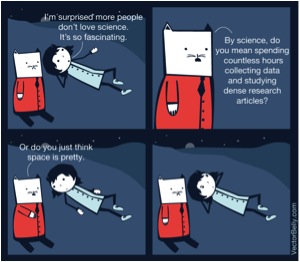Recently I’ve noticed that there is a severe lacking in the science news department around here. We have plenty of coverage of awesome cultural things in the arts, interesting places to explore around Seattle and (astonishingly) actual news–But no science.
I’m here to fix that.
I am by no means a professional scientist (yet) but I am fascinated with how the world works and have been educated most wonderfully here at Seattle University about scientific endeavors and methods (pyschology major, biology minor). This world is unbelievably complex and beautiful and I only want to share a little of that enthusiasm and wonder with all you lovely people.
Every week, I will strive to bring you cutting-edge science, politics and debates around the newest discoveries, and reviews of some of the more science-y events going on here in the Emerald City. I will likely do some pieces about specific problems within scientific disciplines and academia as well. Who knows, I might even throw in some jokes in there. Whether this is one of your first tastes of scientific blogging or if you’re a devout follower of all the science subreddits and sites already, I hope this column can be a portal into how awesome the world is.
There are literally billions of miniscule processes happening right now in there, creating a beautifully complicated dance of chance that turns into YOU. You’re biology! You’re created from trillions of cells–little machines with specific jobs that help you digest things, move your muscles and think.
If that’s not enough to make you a little excited, there are plenty of other reasons to get into science.
1. Science enables technological growth
That phone you have in your pocket or sitting on the table next to you (or in your hand)? That would have never happened if someone in the early 1900’s tried experimenting with wireless technology, which never would have happened if someone in the 1700’s started experimenting with telegraphs (which, by the way, people said was completely stupid and time-wasting). Same with microwaves, computers, cars, light bulbs… the list continues.
2. Science keeps the world in check morally in many ways
Remember when homosexuality was considered a psychological disorder? Or when races have been singled out for being supposedly less intelligent or valuable? Science–GOOD science–has shown us that human differences are completely natural and genetically/environmentally based, not morally detestable or horrible conditions and has brought about social and political change.
3. Science teaches us to think critically about the world
The scientific method is stringent and considers biases, human error and many other factors that can mess with finding evidence for the truth. In my opinion, if more people applied the same principles of science into how they interacted with other people or studied other disciplines, we would end up with a more just world.
What I’m trying to say here is that science is steeped everywhere in modern culture. It’s not only how we make sense of the world, it’s often how we survive in it. It’s how we thrive in it. Even if you yourself are not a scientist who likes to make sure things are statistically significant before making a judgment call or someone who knows sterile technique or gets angry when people use terms like “prove,” you can always appreciate everything science has done to make your life awesome.
So, with that, I say: Thank you, Science.
You’re great.












